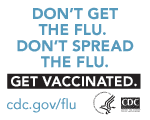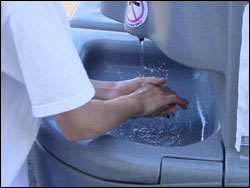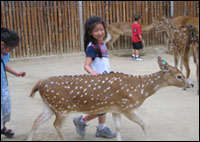CDC Features
Stay Healthy at Animal Exhibits This Summer!
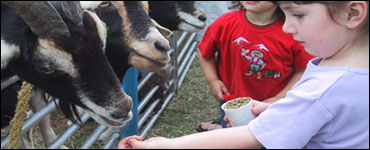
From watching calf roping at the rodeo to petting lambs at the county fair, there are many ways to explore the animal world this summer. Exhibits such as petting zoos and fairs allow children of all ages to have the thrilling experience of coming face to face with animals. This interaction allows people to learn more about animals and helps to build an important human-animal bond.
Unfortunately, many people become sick every year because of a visit to an animal exhibit. It is important to remember that animals sometimes carry germs that are harmful to humans. When people forget to wash their hands after petting an animal or bring food into an area where animals are being housed, they are at risk for becoming ill. You can learn more about these germs and how they cause illness now.
Let's make this summer a healthier season! Below are some tips to help you prevent illness when visiting animal exhibits.
If you are visiting an animal exhibit:
Hand-washing stations
• Find out where hand-washing stations are located.
• Always wash your hands after petting animals or touching the animal enclosure, especially before eating and drinking.
• Running water and soap are best. Use hand gels if running water and soap are not available.
• Directions for washing hands can be found here. (![]() 1 page / 2.4 MB)
1 page / 2.4 MB)
Food and drinks
• Keep food and drinks out of animal areas.
• Do not share your food with animals.
• Do not eat or drink raw (unpasteurized) products including milk products and juices.
• Food should be prepared, served, and eaten only in areas where animals are not permitted (with the exception of service animals).
Children
• Children younger than 5 years old need supervision.
• Never allow children to put their hands or objects (For example: pacifiers) in their mouth while interacting with animals.
• Hand washing should be supervised.
• Do not take or use strollers, bottles, pacifiers, spill-proof cups, or toys in animal areas.
Elderly persons or others who might have a difficult time fighting off infections should use special precautions. You can find out more about these precautions by visiting the Healthy Pets, Healthy People site.
If you manage an animal exhibit:
Facility design
• Design the exhibit so that animal areas are separate from areas where people may eat food.
• Use signs to state where the animal and food areas are located.
• Install hand washing stations at the exit for the animal exhibit. Make sure that some of the hand-washing stations are low enough for children to reach!
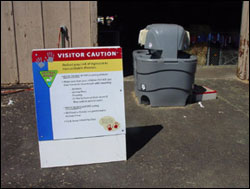
Use plain language and pictures, informing visitors how to keep safe and healthy when visiting animal exhibits.
Education/information
• Educate visitors to wash their hands after handling animals.
• Do not allow visitors to kiss or otherwise allow their mouths to come into contact with animals or their enclosures.
• Be aware that healthy animals can carry germs that might make visitors sick.
• Train staff and educate visitors about preventing disease transmission from animals to humans.
• Use a variety of methods to provide information to the public. For example, use brochures, signs, and verbal instructions. An example of a visitor handout can be found here. (![]() 1 page / 2.12 MB)
1 page / 2.12 MB)
For more information on keeping your visitors healthy:
• Read the Compendium of Measures to Prevent Diseases and Injury Associated with Animals in Public Settings, 2007.
• Download the Acrobat PDF Compendium of Measures to Prevent Diseases and Injury Associated with Animals in Public Settings, 2007. (![]() 28 pages/1 MB)
28 pages/1 MB)
Additional Resources
- Listen to this one-minute summary of recommendations to minimize infectious diseases, rabies, and injuries when at state fairs, petting zoos, and pet stores. (Podcast, 0:59 mins)
- Listen to "Wash Your Hands if You Pet That Bunny," an audio report that presents recommendations for minimizing health risks to visitors to state fairs, petting zoos, and pet stores, as well as to public health officials and animal handlers. (Podcast, 7:15 mins)
- Visit our web site, Healthy Pets Healthy People, for more information on how you and your pet can stay healthy this summer.
Page last updated: July 9, 2007
Content source: National Center for Zoonotic, Vector-Borne, and Enteric Diseases
Content owner: National Center for Health Marketing
URL for this page: www.cdc.gov/Features/AnimalExhibits

